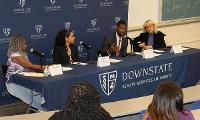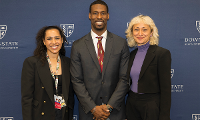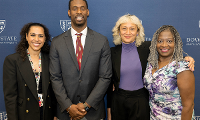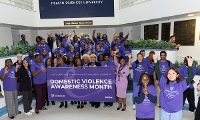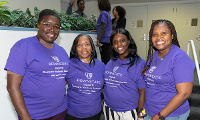Experts Reframe Domestic Violence as a Public Health Crisis
By Office of the President | Nov 4, 2025
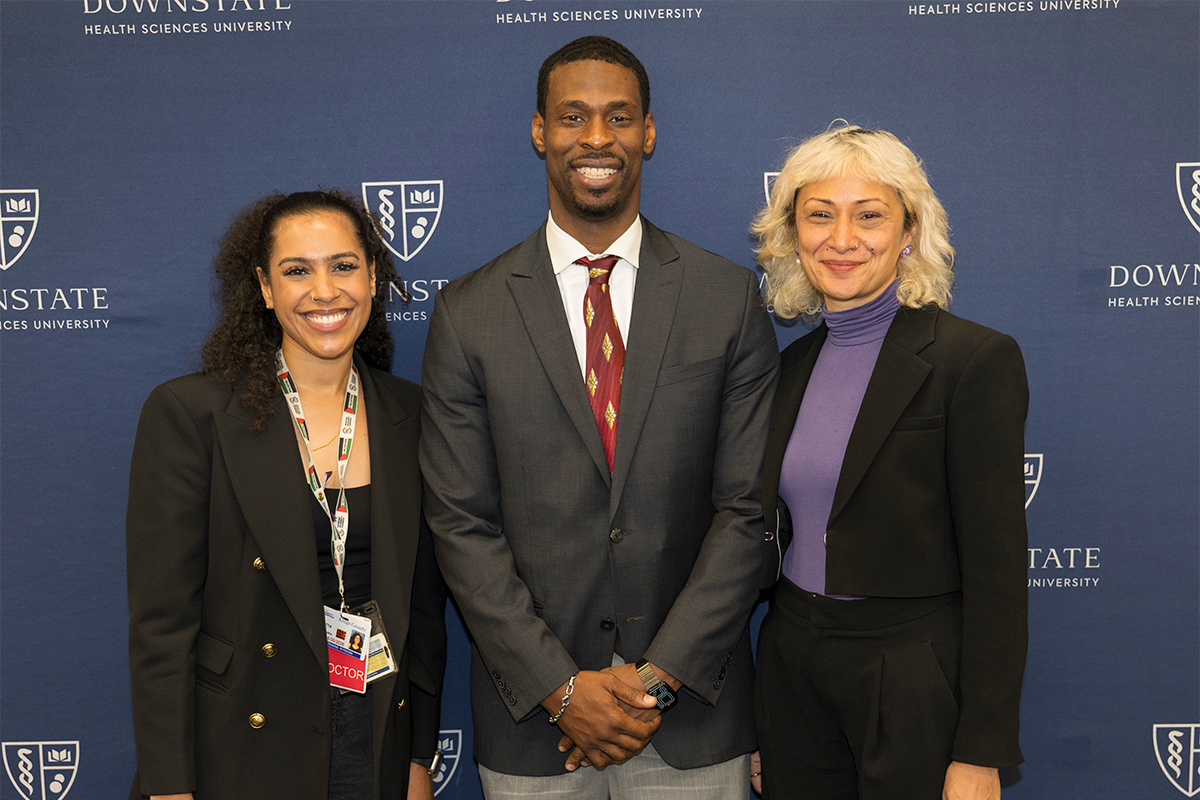
When a survivor arrives in the emergency room, signs of abuse may not always be visible; however, the trauma is there. Understanding and responding to that trauma takes more than medicine; it takes coordination, compassion, and reform. That was the focus of From Harm to Healing, Downstate’s campus conversation on reframing domestic and gender-based violence as a public health issue.
At our recent Domestic Violence (DV) Awareness panel discussion, From Harm to Healing: Reframing Domestic and Gender-Based Violence Through a Public Health Lens, three distinguished panelists explored how trauma-informed care, survivor leadership, and evolving legal frameworks are shaping new pathways to safety, justice, and recovery. Together, they demonstrated how collaboration among health care providers, advocates, educators, and law enforcement can prevent harm and help survivors heal.
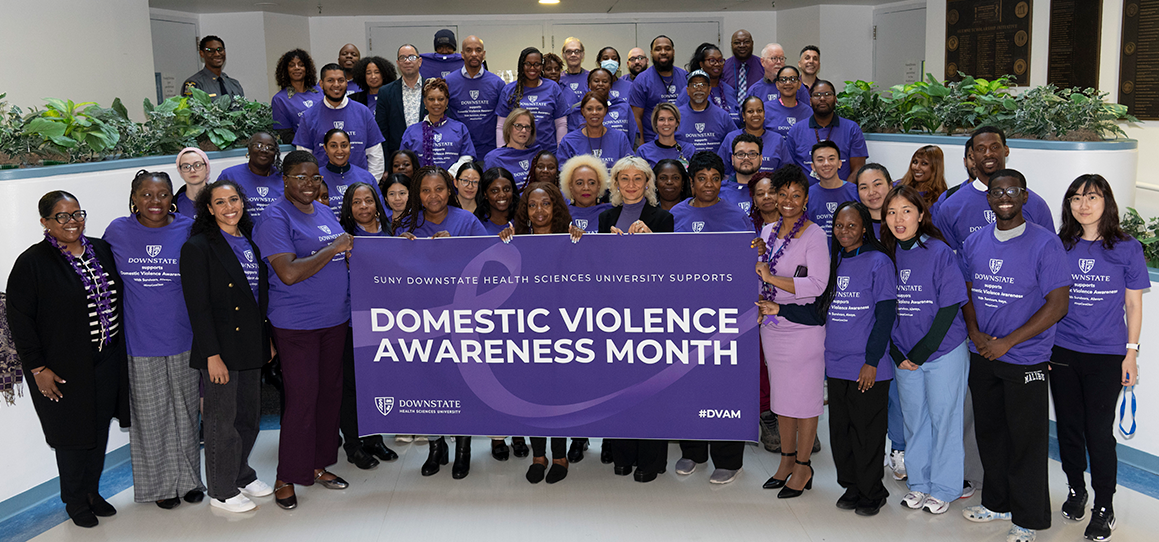
Priyanka Datta, M.D., a Downstate alumna and Director of the Clinical Forensic Medicine Fellowship at NYC Health + Hospitals/Kings County, began by explaining why strangulation remains one of the most dangerous yet least visible forms of abuse. Pressure on the neck or throat, she noted, can deprive the brain of oxygen and blood flow, causing loss of consciousness in as little as seven seconds and leading to seizures, memory loss, and even permanent brain injury, often without a single bruise or external mark.
Survivors focus on immediate concerns such as their children’s safety or housing needs, unaware of the internal damage they may have sustained. To close this gap, Dr. Datta helped develop a survivor-informed educational QR-code tool and co-led the creation of the Strangulation Roundtable. These resources empower survivors with information about symptoms, medical care, and legal options, all of which are accessible privately and compassionately.
This fall, Dr. Datta will open the King’s Care Forensic Follow-Up Clinic at Kings County Hospital, offering trauma-informed outpatient services, forensic documentation, and direct referrals to Family Justice Centers and the District Attorney’s Office. The clinic bridges the gap between emergency care and long-term recovery. “As providers,” she said, “we must empower survivors with knowledge, validate their experience, and ensure they never leave the ER alone in their next steps.”
Commissioner Saloni Sethi of the NYC Office to End Domestic and Gender-Based Violence (ENDGBV) emphasized that lasting prevention must center on survivors themselves. Under her leadership, the office established a paid advisory committee of survivor leaders who review city intake forms, train law enforcement personnel, and test new public tools. Her office’s initiatives ensure that services are culturally sensitive, accessible in multiple languages, and attuned to the realities of immigration, identity, and financial control. “Violence is not a cultural issue,” she said, “It’s about power and inequity.” By bringing survivors into policymaking, the city is reframing them not as recipients of care, but as co-designers of solutions.
Expanding the discussion to include education and empowerment, Marlon Peterson, Executive Director of the College and Community Fellowship, shared how access to higher education transforms the lives of women impacted by incarceration and gender-based violence. Education, he said, restores agency, creates economic independence, and empowers survivors to shape their own futures. College and Community Fellowship alums now include PhDs, JDs, and social workers who advocate for systemic change. Peterson urged policymakers to address structural barriers such as housing instability, financial dependence, and the complex overlap of legal and social systems that often trap survivors. “Survivors are the experts,” he said. “Their experiences must shape the policies meant to protect them.”
As understanding of the medical impact of strangulation deepens, experts and advocates continue to push for legal standards that reflect the seriousness of these injuries. The law has not yet changed; however, ongoing research and advocacy are crucial to reevaluating these charges as we gain a deeper understanding of the long-term harm these injuries can cause.
According to Inspector Haynes, Obstruction of Breathing or Blood Circulation is a misdemeanor, Strangulation in the Second Degree is a Class D violent felony, and Strangulation in the First Degree is a Class C violent felony when serious injury occurs. He noted that continued advocacy, guided by medical research, is essential to strengthening protections for victims of domestic and gender-based violence. Strangulation is a high-risk act; perpetrators who strangle are ten times more likely to kill their victims. Training officers to recognize trauma responses and hidden injuries ensures victims are met with understanding, not suspicion.
For the Downstate community, these insights carry clear lessons. Medical and allied-health staff must recognize the signs of strangulation and coordinate forensic documentation and safety planning even when no visible injury appears. Clinicians, social workers, and advocates should collaborate early with legal, housing, and community partners to create survivor-centered pathways from crisis to stability. Education, financial empowerment, and trauma-informed care should anchor all prevention strategies, recognizing survivors as leaders and co-creators of change. And the strengthened legal framework reinforces that depriving someone of air or circulation is not just an assault; it is a red flag for potential homicide.
From the emergency room to the courtroom to the classroom, each panelist reinforced that ending domestic and gender-based violence demands an integrated, compassionate response. Dr. Datta’s leadership in forensic medicine, Commissioner Sethi’s survivor-driven policymaking, Marlon Peterson’s commitment to education and re-entry, and Inspector Allen Haynes' advocacy for stronger legal protections together form a powerful blueprint for moving from harm to healing.
Downstate remains steadfast in its commitment to embed these principles into its care, teaching, community engagement, and turning awareness into action and compassion into lasting change.
